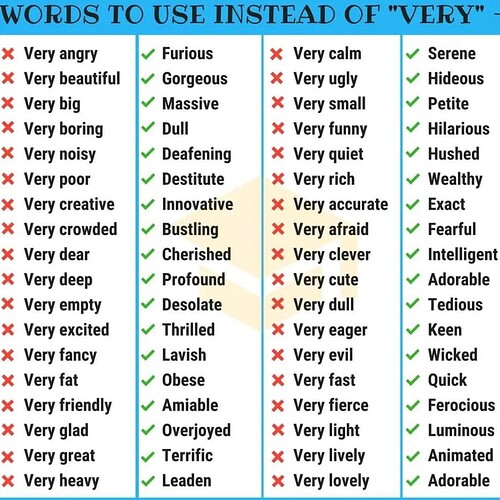A good list for us non-native english speakers ![]()
Something Donald Trump should take note of. ![]()
was this list written by a non-native speaker as well? ![]()
Very interesting! Thank you very much, this will be very useful in the future!
Apparently ![]()
I see what you did there.
![]() Very Useful ✓ Beneficial
Very Useful ✓ Beneficial
While I agree that English has a myriad of wonderful words to choose from, I wouldn’t discourage people from using ‘very’ either.
Instead of scrapping adverbs in favour of more interesting adjectives, try using some more interesting adverbs too:
- really
- quite
- pretty
- a bit
- incredibly
- unbelievably
- ridiculously
- stupidly
- stupendously
Of course, there’s all sorts of hidden usage rules that the dictionaries don’t always tell you. For example, ‘stupidly’ is usually used in a disparaging way - you might say Jeff Bezos is stupidly wealthy, but you probably wouldn’t say Ghandi was stupidly kind (unless you really thought he was kind to the point of being ‘stupid’, e.g. too trusting). But it’s better to try and fail than to avoid trying.
As for the quality of that list, you might want to take it with a pinch of salt.
For a start, that chart has confused ‘leaden’ with ‘laden’.
Laden (pronounced /ˈleɪdən/) means heavy, and is releated to the uncommon verb lade, meaning to load, as in loading cargo or loading a shipment.
Wheras leaden (pronounced /ˈlɛdən/) effectively means ‘of lead’ or ‘lead-like’, referring to ‘lead’ (Latin: plumbum), the greyish, toxic metal.
Even then, I find that ‘laden’ is rarely used on its own. It’s more often used either:
- Hyphenated, as in “a fruit-laden cart”
- Along with ‘with’, as in “his sleigh was laden with gifts”
- Sometimes used metaphorically, as in ‘laden with meaning’ or (a very literary example) ‘laden with sorrow’
In other words, you wouldn’t find many people saying “that lorry seems laden” instead of “that lorry seems heavy”.
To be honest, I’m not really sure there actually is a better alternative for ‘very/really heavy’.
Most alternatives usually imply ‘large’ rather than ‘heavy’, e.g. massive, bulky, hefty.
There’s a few other entries on that list that are odd or have caveats…
For example:
- ‘Petite’, is more often used for females or feminine objects rather than for males or masculine/neutral objects because of its French origins (‘petite’ is feminine in French, the masculine form is ‘petit’). It also tends to imply ‘slim’ when used to refer to women
- ‘Hushed’ is usually only applied to speaking, as in ‘hushed tones’ or ‘hushed voices’, you likely wouldn’t describe a person as being ‘hushed’. E.g. you couldn’t replace ‘a quiet man’ with ‘a hushed man’.
- ‘Fearful’ is less likely to be used than ‘scared’ and ‘frightened’. ‘Fearful’ tends to be used more in a literary or formal context. Also, quite vexingly, it can sometimes mean the opposite, as if it were ‘fearsome’ instead of ‘fearful’, e.g. “a fearful beast” is the kind you hide from, not the kind that hides from you.
I’d best not bore you with the rest (unless anyone is particularly interested?).
Well, you can very often replace “very” with “f**king” and unfortunately I know a few people who do. ![]()
Expletives are best used sparingly, else they lose their impact.
Or at least the stronger ones anyway…
I wouldn’t hesitate to describe something as “bloody heavy” unless there were very young children around.
(I’m half and half on OAPs.)
There’s also plenty of minced oaths to choose from - e.g. bleeding, flaming and ruddy.
(A certain character on a certain British soap opera used to be fond of ‘pigging’, though I always thought it was exceptionally odd.)
